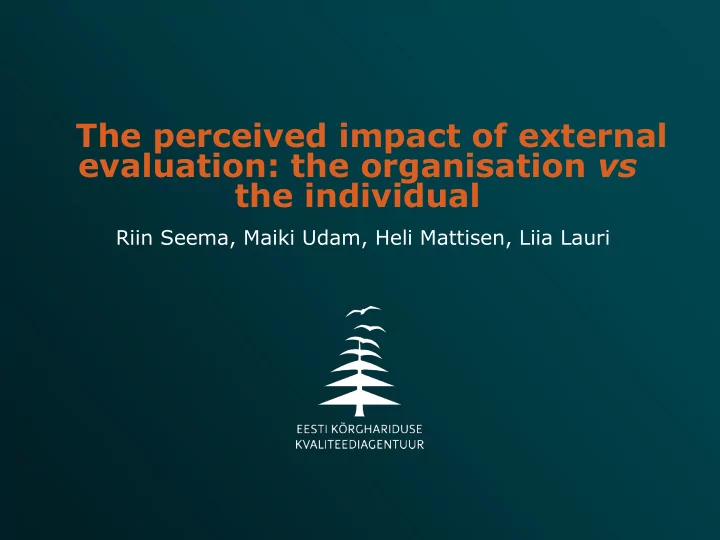

The perceived impact of external evaluation: the organisation vs the individual Riin Seema, Maiki Udam, Heli Mattisen, Liia Lauri
Outline • The Estonian context • Aims of the study • Method • Results • Conclusion 2
The Estonian agency EKKA EKKA’s main purpose is to provide educational institutions with feedback and to support their development. 3
The contradictory goals of external evaluations • The aim in external evaluation is to support autonomy and encourage improvement, while at the same time keeping the institutions accountable and comparable. • In Estonia, HEIs must undergo institutional accreditation and the quality assessment of study programme groups once every seven years. 4
The current study • This study was conducted by the Estonian Higher Education Quality Agency (EKKA). • Quantitative and qualitative methods were used (i.e. the concurrent mixed method)(Tashakkori and Cresswell 2007). • The perceived effect of evaluations on the level of the system and the individual was analysed. 5
The main questions in the study • How do employees of HEIs perceive external evaluation? • Is the attitude towards external evaluation mostly positive or negative? • Do the employees’ attitudes depend on the type of HEI and the main role of its employees, their age and gender? • What does external evaluation mean to employees? 6
Method • The study was conducted in spring 2014. • An Internet-based questionnaire was sent to all Estonian HEIs. • The study was anonymous. • The data were processed in SPSS and Nvivo. 7
Study participants 361 Estonian employees of HEIs: • 261 from universities • 100 from professional higher education institutions university 28% professional higher 72% education institution 8
Participant’s primary role in the HEI other worker; 16 manager; adminis- 52 trative worker; 79 lecturer; 143 researcher; 71 9
Participant’s age groups <30 14% 17% 31 - 40 a. 41 - 50 a. 51 - 60 a. 25% 22% >61 22% 10
Participant’s gender 23% male female 77% 11
Measures A 10-item questionnaire on a six-point scale examined the perceived impact of external evaluation. Sample items: • „ External evaluation helps to raise awareness of the weaknesses in the system and to find solutions “. • „ External evaluation makes those being assessed feel controlled and pressured “ . 12
Measures Respondents were also asked to complete two sentences: • “ To me, external evaluation means …” . • “External evaluation influences…”. 13
The statistical analysis The collected data were analysed with following methods: • factor analysis • reliability analysis • descriptive statistics • independent samples test • analysis of variance • multidimensional scaling analysis • summative content analysis 14
Perceiving positive and negative impact of external evaluation by different groups surveyed Characteristics Positive influence Negative influence Gender No differences No differences Age No differences No differences No differences The type of HEI The staff from professional institution higher education institutions perceive the positive influence more than the staff form universities No differences The primary role in the The managers perceive the HEI positive influence more than other employees 15
What does the external evaluation mean to employees? • A director : A lot of extra work and analysis. A lot of stress. Forces you to assess realities objectively, which is good. • A lecturer : Compiling a lot of bureaucratic documents, conducting sometimes pointless analyses, producing an immense amount of text. Sometimes also content discussion and team work (to the effect of “fighting a common enemy”). Slight frustration, because a lot of work is done but it has little impact on our everyday work and is not paid for separately. There are not enough explanations of why another evaluation is coming up and what it’s good for... 16
What does the external evaluation mean to employees? • A researcher: A thorough and honest overview of my work and activities from a different angle from everyday feedback. • An administrative worker: Some additional tasks in helping to prepare for evaluation. 17
What does the external evaluation influence? • A director: Consolidating staff around a common goal and analysing what’s been done supports increasing and maintaining quality. • A lecturer: External evaluation of higher education institutions forces them to critically analyse their activities and find ways of making them more efficient. • A researcher : It mainly means stressing external indicators (the magic of big numbers). • An administrative worker: Primarily the internal climate and structure of the organisation, but hopefully the quality of Estonian education and research activities in the long run. 18
Organisation vs individual: the perceived impact of external evaluation 19
Conclusion • External evaluation has both a positive and negative impact. • Evaluation is necessary at the level of the organisation or the higher education system. • Managers perceive the positive impact of external evaluation the most. • Employees feel that external evaluation increases bureaucracy and also leads to extra work and stress. 20
System/organisation versus individual The perceived positive and negative impact of external evaluation differs depending on the organisational vs individual viewpoint. 21
Recommend
More recommend